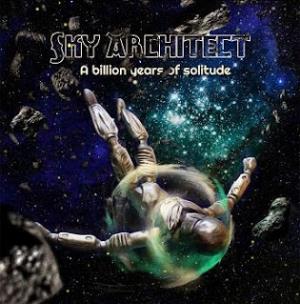With the release of its stunning debut LP, Excavations of the Mind, three years ago, Rotterdam quintet Sky Architect declared itself a promising and unique new force in the modern progressive rock landscape. A fairly mellow affair, the record was nonetheless quite complex, as its intricate arrangements were complemented by surrealistic melodies and organic tones. Interestingly, its successor, A Dying Man’s Hymn, was considerably more adventurous, sporadic, and ambitious, resulting in a slightly less accessible yet inarguably more layered experience. Now the group returns with A Billion Years of Solitude, and it’s just about as enticing, virtuosic, and idiosyncratic as you’d expect.
The secret to Sky Architect’s success is the way the band incorporates prophetic experimentation and various influences (including Dream Theater, the Flower Kings, Pink Floyd, and Genesis) into standard genre templates. The result is among the freshest and most invigorating sounds in the genre today. Thematically they’re no strangers to psychological turmoil, and A Billion Years of Solitude is no different, save for the fact that both its concepts and compositions are noticeably more, well, spacey. They describe it as “[evoking] the feel of sci-fi movies from the 50s and 60s. Listening to it, you will be transported to a universe and era in which black holes and supernovas are an essential part of everyday life, intergalactic wars are waged and multidimensional beings are waiting past every corner to lunge at you.” Interestingly, the album explores these ideas with its production techniques just as much as its lyrics, making listeners feel these effects with or without words.
The album opens with its longest track, “The Curious One.” After some bombastic psychedelic riffs and spacey sounds (a combination that definitely recalls classic Nektar works, such as Recycled), things fade into a typically melancholic build up in which guitar arpeggios decorate vocalist Tom Luchies foreboding verses and delicate chorus. Eventually the gang incorporates a lot of counterpoint and frenzy (like a rawer version of Gentle Giant), as well as explosive solos. It’s wonderfully symphonic and bold, and of course the song includes a reprisal of the opening catastrophe near the end.
Elsewhere, “Wormholes” juxtaposes chaos with somber reflection, as Luchies’ singing fits perfectly with the tonal patterns. There’s an especially brilliant dynamic shift near the end of the track, in which the heaviness switches to a calming waltz. “Tides” contains the most immediately gratifying melody, as well as guitar work (both beautiful acoustic passages and aggressive blocks) that brings Opeth to mind. “Jim’s Ride to Hell” is a trippy (and brief) instrumental packed with fiery rhythms and staccato plucking; really, it’s reminiscent of Between the Buried and Me’s ingenious The Parallax II: Future Sequence. Expectedly, the last two tracks follow the same model as the rest of the album.
If there is any flaw in A Billion Years of Solitude, it’s that the music overshadows the vocal contributions. In other words, as pleasant as they are, Luchies’ parts aren’t as memorable or distinctive as they’ve been in the past. On the other hand, though, the arrangements are exceedingly inventive and surprising, so they make up for it. Still, the lack of infectious singing is a bit of a letdown.
In the end, A Billion Years of Solitude is another great entry in Sky Architect’s discography. It’s arguably their most elaborate and striving LP yet, and the emphasis on spacey textures and odd effects makes it feel sufficiently different from its predecessors (although all of their beloved trademarks are still here, of course). Not only is it a fine addition to the group’s catalogue, but it’s also one of the best progressive rock releases of 2013. Do yourself a favor and check it out ASAP.




